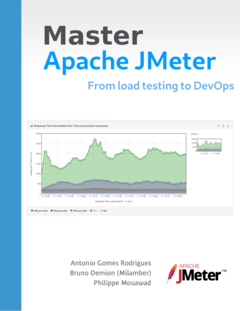Using homebrew to install and configure JMeter under Mac OSX
Context:
You have a MacOSX and want to install Apache JMeter in 5 seconds and you’re too lazy 🙂 to download it from JMeter.
Being a Mac user, you probably already use the famous package manager homebrew.
How to install JMeter core:
Just run:
brew install jmeter
You can then run jmeter help by typing:
jmeter -?
which will output:
PMD-MBP-BEETH:~ PhilM$ jmeter -h Writing log file to: /Users/PhilM/jmeter.log _ ____ _ ____ _ _ _____ _ __ __ _____ _____ _____ ____ / \ | _ \ / \ / ___| | | | ____| | | \/ | ____|_ _| ____| _ \ / _ \ | |_) / _ \| | | |_| | _| _ | | |\/| | _| | | | _| | |_) | / ___ \| __/ ___ \ |___| _ | |___ | |_| | | | | |___ | | | |___| _ < /_/ \_\_| /_/ \_\____|_| |_|_____| \___/|_| |_|_____| |_| |_____|_| \_\ 3.1 r1770033 Copyright (c) 1999-2016 The Apache Software Foundation To list all command line options, open a command prompt and type: jmeter.bat(Windows)/jmeter.sh(Linux) -? -------------------------------------------------- To run Apache JMeter in GUI mode, open a command prompt and type: jmeter.bat(Windows)/jmeter.sh(Linux) [-p property-file] -------------------------------------------------- To run Apache JMeter in NON_GUI mode: Open a command prompt (or Unix shell) and type: jmeter.bat(Windows)/jmeter.sh(Linux) -n -t test-file [-p property-file] [-l results-file] [-j log-file] -------------------------------------------------- To run Apache JMeter in NON_GUI mode and generate a report at end : Open a command prompt (or Unix shell) and type: jmeter.bat(Windows)/jmeter.sh(Linux) -n -t test-file [-p property-file] [-l results-file] [-j log-file] -e -o [Path to output folder] -------------------------------------------------- To generate a Report from existing CSV file: Open a command prompt (or Unix shell) and type: jmeter.bat(Windows)/jmeter.sh(Linux) -g [csv results file] -o [path to output folder (empty or not existing)] -------------------------------------------------- To tell Apache JMeter to use a proxy server: Open a command prompt and type: jmeter.bat(Windows)/jmeter.sh(Linux) -H [your.proxy.server] -P [your proxy server port] --------------------------------------------------- To run Apache JMeter in server mode: Open a command prompt and type: jmeter-server.bat(Windows)/jmeter-server(Linux) ---------------------------------------------------
or :
jmeter -h
which will output:
XXXXX:~ PhilM$ jmeter -? Writing log file to: /Users/PhilM/jmeter.log _ ____ _ ____ _ _ _____ _ __ __ _____ _____ _____ ____ / \ | _ \ / \ / ___| | | | ____| | | \/ | ____|_ _| ____| _ \ / _ \ | |_) / _ \| | | |_| | _| _ | | |\/| | _| | | | _| | |_) | / ___ \| __/ ___ \ |___| _ | |___ | |_| | | | | |___ | | | |___| _ < /_/ \_\_| /_/ \_\____|_| |_|_____| \___/|_| |_|_____| |_| |_____|_| \_\ 3.1 r1770033 Copyright (c) 1999-2016 The Apache Software Foundation --? print command line options and exit -h, --help print usage information and exit -v, --version print the version information and exit -p, --propfile <argument> the jmeter property file to use -q, --addprop <argument> additional JMeter property file(s) -t, --testfile <argument> the jmeter test(.jmx) file to run -l, --logfile <argument> the file to log samples to -j, --jmeterlogfile <argument> jmeter run log file (jmeter.log) -n, --nongui run JMeter in nongui mode -s, --server run the JMeter server -H, --proxyHost <argument> Set a proxy server for JMeter to use -P, --proxyPort <argument> Set proxy server port for JMeter to use -N, --nonProxyHosts <argument> Set nonproxy host list (e.g. *.apache.org|localhost) -u, --username <argument> Set username for proxy server that JMeter is to use -a, --password <argument> Set password for proxy server that JMeter is to use -J, --jmeterproperty <argument>=<value> Define additional JMeter properties -G, --globalproperty <argument>=<value> Define Global properties (sent to servers) e.g. -Gport=123 or -Gglobal.properties -D, --systemproperty <argument>=<value> Define additional system properties -S, --systemPropertyFile <argument> additional system property file(s) -L, --loglevel <argument>=<value> [category=]level e.g. jorphan=INFO or jmeter.util=DEBUG -r, --runremote Start remote servers (as defined in remote_hosts) -R, --remotestart <argument> Start these remote servers (overrides remote_hosts) -d, --homedir <argument> the jmeter home directory to use -X, --remoteexit Exit the remote servers at end of test (non-GUI) -g, --reportonly <argument> generate report dashboard only, from a test results file -e, --reportatendofloadtests generate report dashboard after load test -o, --reportoutputfolder <argument> output folder for report dashboard
Where to find the configuration files:
Once you’ve installed with homebrew, you may be lost with JMeter configuration files as the folders differ a bit, so here is the mapping from Core JMeter to Homebrew installed JMeter:
| Item | Standard JMETER | Homebrew installed JMeter |
|---|---|---|
| Plugins folder | <jmeter home>/lib/ext | /usr/local/Cellar/jmeter/3.1/libexec/lib/ext |
| Library folder for plugin dependencies | <jmeter home>/lib/ | /usr/local/Cellar/jmeter/3.1/libexec/lib/ |
| Configuration folder | <jmeter home>/bin | /usr/local/Cellar/jmeter/3.1/libexec/bin/ |
You are now able to:
- Edit user.properties or jmeter.properties file in “Configuration folder”
- Add a dependency to JMeter in “Library folder”
- Add a plugin to JMeter in “Plugins folder”
About author:
Philippe Mouawad is a developer, committer and member of the JMeter Project Management Committee at Apache.
He is also the co-author of the book Master JMeter : from load testing to DevOps
He works as an Architect and technical expert for Ubik-Ingenierie where he leads among other things the development of UbikLoadPack a set of Commercial Plugins for Apache JMeter allowing to load test different protocols like HLS, GWT, Flex.
About us:
- We provide professional services for Load Testing
- Our solutions Ubik Load Pack are used by Big players
- Get a Free trial






